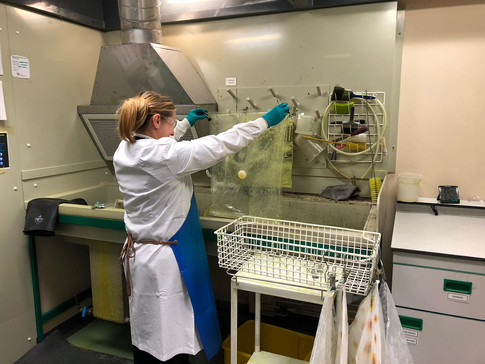Days and nights with the Hertfordshire Constabulary
I went to Watford Police Station to ride along with Watford Intervention Team E on their afternoon and evening shift. I met first with Chief Inspector Matt Phillips who told me about the challenges of local policing in Watford and the partnerships they have with other agencies locally to tackle knife crime and county lines activity in particular.
Then I met officers Eric and Charlie whose shift started with a hand over briefing at 3pm. I had barely put on my high viz jacket and got into their police car when we were directed to assist a victim who reported that he had been robbed. After a few minutes of driving very fast through Watford with blue lights, we found the young victim who had been left without his very expensive trainers and 3 of his 4 mobile phones. This proved to be an interesting case, as the victim was too young to sign his own statement without an adult family member present, so we had to visit his home where we found that his parents did not understand enough English to help, returning later when his older sister had arrived to interpret.
Meanwhile other officers had found some of the group that the victim had described and the stolen phones had been recovered (but not, to his great disappointment, his £500 Balenciaga trainers).
The officers dealt with this case sensibly and sensitively as the young man admitted to having been previously involved in selling drugs (and could not explain why he needed so many phones) but was in this instance the victim. Although he originally said that he did not know his attackers and did not want to take the matter further, he finally agreed to testify if required.
A great deal of paperwork then needed to be completed and co-ordinated with the other officers who had made arrests connected to this case. Those arrested were well known to officers, with multiple offences, and one was in fact banned from coming to Watford. It was interesting to hear about the efficacy of the various banning orders and the frustrations of the police in dealing with those who are already known to offend but cannot be deterred from re-offending.

As the evening progressed a number of other incidents arose, including a number of car drivers stopped for being uninsured and one who had no driving licence in addition (and 6 adult passengers and 2 children not in car seats). Eric, Charlie and I stopped during the evening for supper at KFC and their shift finished at midnight. They were cheerful and professional throughout and it was a privilege to see them in action.

Later in November I spent a day at Police HQ. I started the morning with one of the Chief Constable’s staff officers who explained how she does the reports for the Chief’s briefing each morning, taking the information that comes in from all the CSPs and cross checking to see what high profile cases should be brought to the briefing. Amongst the cases was a report of an assault on a police officer, which the Constabulary take very seriously and always follow up to make sure that the officer is fully supported.
First, I went to the Force Control Room to learn about how the calls are taken and passed to dispatchers. This is an impressive and carefully monitored and supervised operation and I was able to listen in to an operator dealing with calls. There is a mental health triage nurse available to help with calls and go out with officers – an excellent initiative.

Next to watch Tri-Force police dogs training. It is a way of life to have a police dog at home with your family and the dogs are trained by the constant positive endorsement of correct behaviour, in a fun and playful environment. These dogs can detect drugs or explosives and are still better than any airport security machine!
On to fascinating Forensics where a team of scientists work on everything from finger print detection to digital forensics. This is a rapidly changing world as ‘the internet of things’ (for example, your fridge detecting when you need to shop) adds further complications and challenges.
Finally, to Safeguarding to meet the team whose job it is to look after vulnerable adults and those with mental health problems. This small team does excellent work in working with those who have been abused by someone in a position of trust or responsible for their care.
A few days later I was learning about a completely different range of rural policing concerns at the East Herts Barn meet at Halfway House farm. Farmers and those from rural communities met with the Chief Constable and others to discuss matters of concern to them. Issues raised included the time taken to answer 101 calls, fly tipping, the new ECHO intelligence gathering tool, housing developments and priorities for East Herts. There was a special award for retiring Sgt Duncan Wallace, very respected for his knowledge of rural affairs and based in Buntingford. Succession planning within the Constabulary is also a concern and Duncan will be missed.













